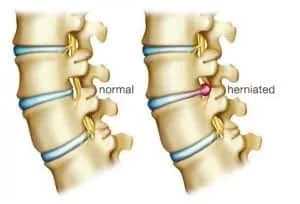Herniated Disk
Herniated Disk (Ruptured Disk or Slipped Disk)
What is a herniated disk?

A disk is a donut shaped rubbery cushion between each of the individual bones or vertebrae that stack up to make up your spine. The disk is a bit like a jelly donut with the center of the disk encased within a tougher exterior. A herniated disk can also be referred to as a slipped disk or ruptured disk. A herniated disk occurs when some of the “jelly†pushes out through a tear in the tougher exterior.
When a disk is herniated, it can irritate nerves and result in pain, numbness or weakness that radiates down the arm or leg depending on which disk is herniated.
Some people may have a herniated disk and not experience any symptoms while others may need surgery to correct the herniation.
What causes a disk herniation?
The most common cause of a herniation is gradual, aging related wear and tear called disk degeneration. The aging process can cause the spinal disks to lose some of their water content which makes them less flexible and more prone to tearing or rupturing with even a minor strain or twist. The medical term for this condition is degenerative disk disease and everyone eventually has this condition.
Sometimes using your back muscles instead of your leg and thigh muscles to lift a heavy object can lead to a herniated disk.
Another cause can be a trauma such as a fall or car accident. The impact of a car accident can cause a herniated disk especially if the person is predisposed to developing a herniated disk.
What factors contribute to getting a herniated disk?
Some factors that can increase your risk of a herniated disk are being overweight because the extra body weight causes extra stress on the disks in the low back.
A physically demanding occupation can increase the risk such as a job with repetitive lifting, pulling, pushing, or bending and twisting.
Finally, genetics can be an increased risk because some people are predisposed to developing a herniated disk.
What should I do if I think I have a herniated disk?
You should seek emergency medical attention if you have worsening symptoms such as pain, numbness, or weakness to the point that you can not preform your usual daily activities, if you have bladder or bowel dysfunction such as becoming incontinent or having difficulty urinating even with a full bladder. Seek emergency medical attention if you have “Saddle Anesthesia†which is the progressive loss of sensation that affects the areas that would touch a saddle, the inner thighs, back of legs, and area around the rectum.
To prevent a herniation that is not caused by a trauma, maintain good posture, exercise to strengthen the trunk muscles that help stabilize and support the spine, and maintain a healthy weight.
If you have experienced a trauma such as a car accident, then once you have obtained medical attention, the next step would be to contact a personal injury lawyer to help with medical bills, lost wages, and property damage.
The Traub Law Office excels at helping our clients who suffered a herniated disk due to trauma. Call us at (512) 246-9191 or complete the form below if you need our help.



